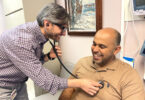We may welcome October, but the flu is unfortunately part of the season. So do you really need to throw away your toothbrush and that favourite lipstick if you get sick? What’s the best approach to contact lens care? And how should you kill any nasty flu germs on your sheets and towels? Natasha Salt, Sunnybrook’s Director of Infection Prevention and Control, serves up a reality check in this flu-prep quick quiz:
About the author
Monica Matys
Monica Matys is a Communications Advisor at Sunnybrook.
Have a question about this post? Get in touch.








